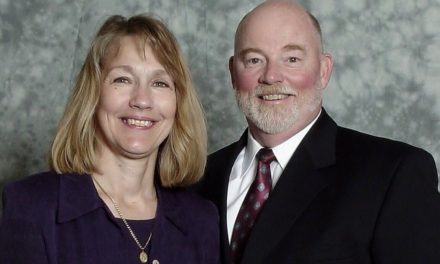By T. Patrick Hudson
KANSAS CITY, Mo. (MBTS) — Christian university leader David Dockery spoke on “Evangelicalism: Past, Present, and Future” at Midwestern Baptist Theological Seminary in a mid-January address.
Dockery, president of Trinity International University in Deerfield, Ill., is the former president of Baptist-affiliated Union University in Jackson, Tenn.
Midwestern President Jason Allen underscored Dockery’s standing to address the topic.
“At Midwestern Seminary, our goal is to train pastors and ministry leaders on a number of topics that will benefit them well into their ministries,” Allen said. “The topic of the state of evangelicalism is one such critical issue in America, and I can think of no one I would respect more to address it. Dr. Dockery brings a wealth of knowledge and experience about the topic, and he is one of the most respected men in theological education — both within the Southern Baptist Convention and broader evangelical world.”
In the address, Dockery said the best way to understand evangelicalism is as a large “umbrella group” that includes many sub-movements and thousands of para-church organizations.
Among denominations, Dockery said, citing Princeton sociologist of religion Robert Wuthnow as a source, “A major shift in the structure of American religion had taken place by the end of the 20th century; a shift now best understood in terms of the commonality held across the historic denominational lines rather than within traditional denominational structures. Every major denomination now has its own renewal evangelical movements.”
From the perspective of Southern Baptists, Dockery noted it is best to think of them as “denominational evangelicals.”
Dockery further defined evangelicalism, from a historical and biblical standpoint, as having basic beliefs centered in and grounded in Jesus Christ. Evangelicals see the core of the Christian faith in such doctrines as the Trinitarian God; salvation by grace through faith; the need for personal conversion; and truths made known in a fully truthful and authoritative Bible.
“Evangelicals believe that salvation is by God’s grace alone through faith in Jesus Christ,” Dockery said. “By grace believers are saved, kept and empowered to live a life of service. It is the affirmation of and genuine commitment to the central beliefs of historic orthodox Christianity, as these beliefs have been courageously retained in various eras and contexts….”
In the 21st century, evangelicalism is anything but a unified, flourishing movement in North America, Dockery said.
At the same time, he said, “It must be noted that evangelicalism is not necessarily dying in America. It is alive and well, but alive and well in an intercultural context.”
Expounding further, Dockery said evangelicalism is rapidly growing in ethnic minority churches, yet declining in traditionally white congregations. He said it is important to take heart in recognizing the rapidly changing demographic patterns in America, coupled with Christianity’s expanding global context.
“Evangelicalism today has recaptured the importance of local churches, but often more so across denominations and within cooperating networks, rather than within the denominations themselves,” Dockery said. “Evangelicals and evangelical denominations that thrive must remain connected to their heritage and tradition, while exploring and working together in rapidly changing demographic settings as well as a new global context — working cooperatively in a renewed way with these various networks and special purpose groups.” He said such groups include Youth for Christ, World Vision, Campus Crusade, the Navigators, Prison Fellowship, Christianity Today, InterVarsity, Wycliffe Bible Translators and others.
Several challenges facing evangelicalism, Dockery said, include recognizing that the actual number of evangelicals in America is less than previously thought. Thus, the unity of evangelicals is extremely important, he said.
“Being aware that our unity, or perceived unity, is threatened by politics, key doctrinal differences, a variety of approaches to church and worship, methods of ministry, and diverse opinions on ethical and social issues is essential for our own self-awareness, not to mention for efforts related to missional and ministry collaboration.”
Other challenges noted by Dockery are the rise of secularization; a growing interest in a vast and amorphous spirituality, a new atheism and the rise of the “nones,” all of which were shaped by and within a postmodern culture. Additionally, key leaders of the past generation who shaped evangelicalism have passed away or are retiring from ministry. These issues, whether as a result or coincidentally, have led evangelicals to be seemingly adrift, Dockery said.
Of these challenges, Dockery suggested, “What is needed now is a recognition that North American and European evangelicalism has been weakened in large sectors of the church and is under assault in our secular culture, experiencing what John Dickerson has called ‘the great evangelical recession.'”
Looking to the future of evangelicalism, Dockery stated, “We must realize our struggles are not with or against fellow Christ-followers, but against the expansion of unbelief in our secularized culture. At stake is the unity and mission of the Christian movement as well as the bedrock issues of the Christian faith.
“What is needed is biblical orthodoxy, a historic Christianity, a faithful intercultural, intergenerational, transcontinental, transdenominational evangelicalism, which stands or falls on first-order issues like the Holy Trinity, the deity and humanity of Christ, the uniqueness of the Gospel message, the divine inspiration and authority of God’s written Word, and salvation by faith alone….”
Dockery added that evangelicals must, once again, take seriously the biblical call to unity portrayed in John 17 and Ephesians 4. He cautioned, however, that evangelicalism must not move, even unintentionally, in the direction of an unhealthy inclusivism or heterodoxical universalism.
There is a need for evangelicals to “hold together the priority of evangelism and the need for social justice, a vision for global missions and intercultural and missional service,” Dockery said.
“We need to understand who we are as evangelicals to recognize afresh the movements that have shaped us…. We need a new spirit of mutual respect and humility to serve together with those whom we have differences of conviction and opinion…,” Dockery said.
“Let us ask God to grant us a renewed commitment to the Gospel, to the church, to the truthfulness of Holy Scripture and transformed living that will help to extend the gospel around the globe while bringing renewal to the church of Jesus Christ for the glory of our great and majestic God.”
Following the Jan. 14 address, Dockery joined Allen, Jason Duesing, Midwestern’s provost, and John Mark Yeats, the seminary’s undergraduate dean, for further dialogue on the topic of evangelicalism.
To view the panel discussion in full, visit http://jasonkallen.com/2015/01/video-dr-dockery-luncheon.
To view Dockery’s address in full, visit http://www.mbts.edu/video-speaker/dr-david-dockery.








